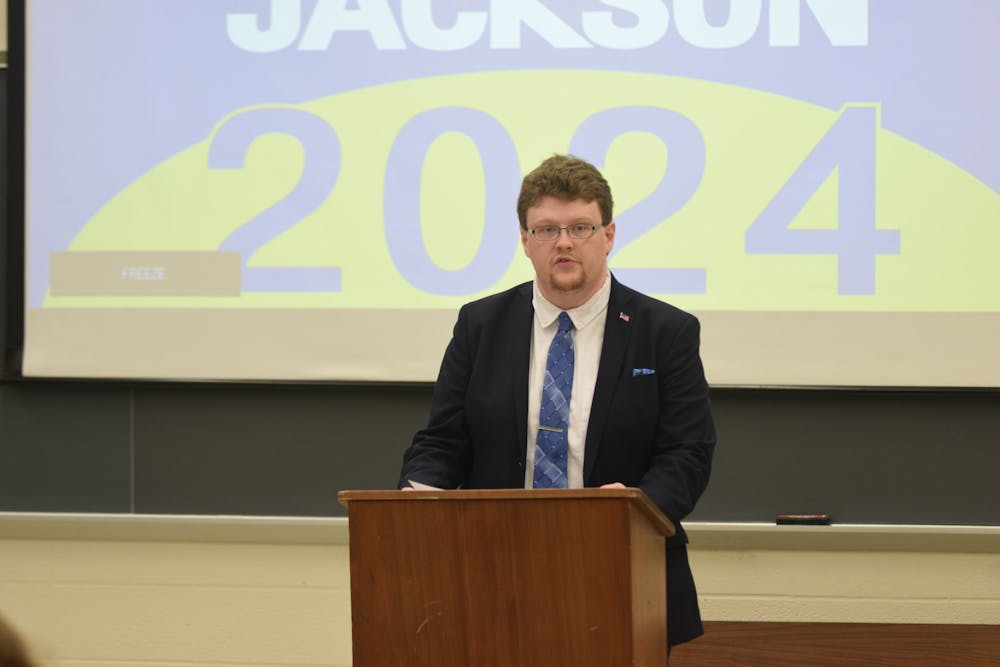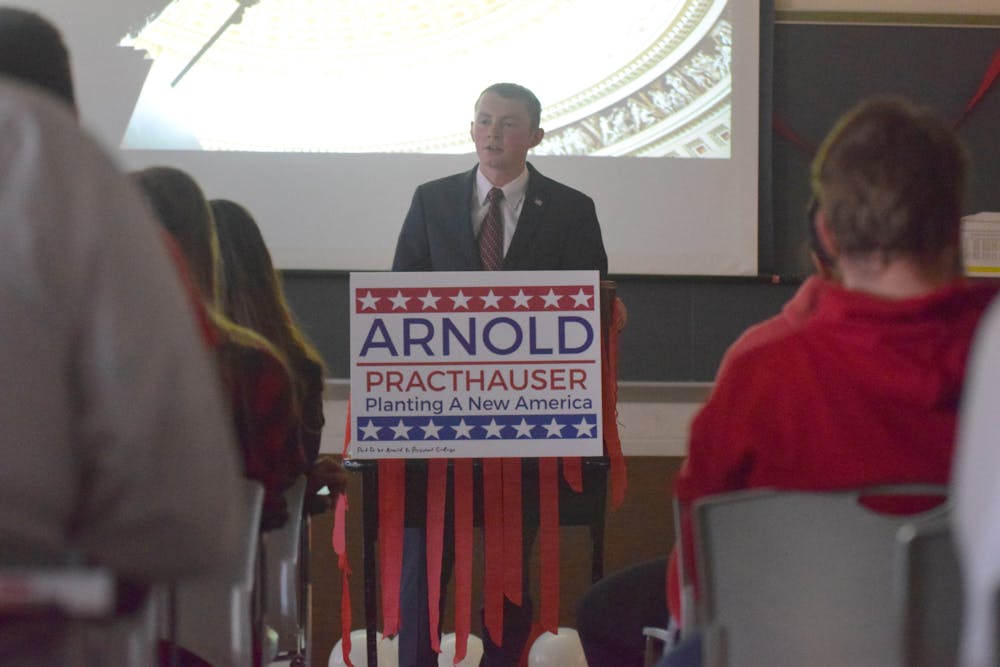
Democratic nominee Ian Thompson addresses a mock Democratic National Convention, outlining his vision for a brighter future for the United States.
More than 150 million ballots cast. 538 electoral votes declared. Countless political text messages sent.
It is safe to say that the 2024 presidential election has come and gone. But dozens of Shippensburg University students are not quite done with the political process.
Members of the Political Science and Communications, Journalism and Media departments have spent the last few weeks acting as candidates, campaign staffers and political consultants in the 10th biennial Simuelection.
Since 2004, SU political science professor Alison Dagnes has led her Campaigns and Elections classes in a full simulation of the presidential political process. Students decide what party they will represent, how they want to campaign and why voters — fictional ones, of course — should choose them.
This year, members of CJM associate professor Stephanie Witmer’s Basic News Reporting and PR Writing II classes have joined the process and are acting as newsroom staffers and public relations consultants.
Journalism students have been split into three newsrooms -— one left-leaning, one right-leaning and one center — and public relations students are consultants for the two campaigns and Super PACs.
“Everyone is hopefully playing to their strengths, and this project is going to have them stretch not only in their content creation but also in their abilities to collaborate, manage their time effectively and coordinate things,” Witmer said.
Over the weeks before Election Day on December 2, the mock candidates -— Colin Arnold and Daniel Practhauser on the Republican ticket and Ian Thompson and DJ Jackson on the Democratic ticket — will sit down for broadcast interviews in the SUTV studio and will appear on student-run podcasts.
“I’m not a PR professor, and I’m not a journalism professor, so this has been very interesting,” Dagnes said. “I think [the students have] learned just a tremendous amount about strengths and weaknesses and who’s an expert and who’s not, and why expertise matters.”
In addition to this being the first Simuelection alongside the CJM department, it is also the first cycle in which Dagnes has not mandated students representing the major parties adopt their policies.
With such uncertainty as to what the modern GOP and Democratic Party look like, Dagnes allowed students to choose their positions for the first time.
“What’s very interesting to me is that it appears, after the first week, that the students have reverted back to the kinds of Republicans who I’m used to. Sort of the, not just 20-year-old, but like 10-year-old Republicans,” Dagnes said, referring to the Republican politics of the 2000s and 2010s.
Those policy positions were outlined for voters at the mock RNC and DNC conventions hosted Monday afternoon in Heiges Field House.
About three dozen students acting as staffers, delegates and public relations consultants cheered and took photographs as the candidates made their case.
“Our campaign is here to make a change for the American people,” Arnold campaign spokeswoman Gianna Weigel said. “We see you and we hear you.”
Arnold outlined his vision for America during his address and emphasized the importance of a robust American economy.
“They have dried the soil with disastrous economic polices,” Arnold said. “My first priority as president will be lowering inflation.”
When he is off the campaign trail, Arnold serves as the student representative on SU’s Council of Trustees and sees the impact of political awareness for both fields.
“Students are interested in politics and once they have an understanding of the process, they increase their engagement, and I have noticed the same thing while serving as student trustee,” Arnold said.
“Students will not engage if they do not know, so being able to better inform students is critical to getting them involved and letting them know that they each play a crucial role in the educational, political, and governmental systems of our nation,” Arnold said.
Arnold’s mock opponent, Ian Thompson, addressed his support for pathways to legal immigration and the importance of protecting reproductive rights.
“I will fight to codify Roe v. Wade into federal law,” Thompson said. “This is about more than abortion. It’s about principle.”
Aside from preparing convention speeches, both campaigns have also developed Instagram profiles, @thearnoldarmy and @ianhq2024, to further simulate the real-world nature of this project.
“This is different than group work, it’s not just like, okay, we have to do a PowerPoint,” Dagnes said. “Oh, no, you screw up the travel, and the candidates can’t get to New Mexico? Oh, you’re f*****d.”
Since first hosting the Simuelection in 2004, Dagnes has seen a significant shift in students’ attitudes toward the political establishment and democratic system, some of which is attributed to students growing up in the Trump era of American politics.
“There’s an ongoing and growing antipathy toward ‘elites,’ which really include not only journalists and media outlets but also college professors,” Dagnes said. “They just don’t really trust the system.”
Dagnes stressed, however, that claims of Generation Z being particularly apathetic toward the political process lack context.
“When people say, oh, you know Gen Z, they don’t vote. It’s the 18 to 22 year olds that don’t vote. Every freaking year,” Dagnes said. “They will. Maybe it’s the experience that they’ve had that makes them get energized and invigorated.”





The Slate welcomes thoughtful discussion on all of our stories, but please keep comments civil and on-topic. Read our full guidelines here.